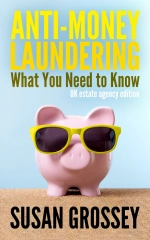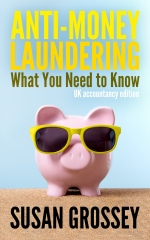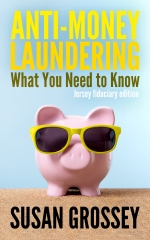My short AML survey is still live (until 31 March 2017) so please do have a go if you haven’t yet: https://www.surveymonkey.co.uk/r/VM62T6K
Oooo, you know how a love a good consultation, and this week I’ve been enjoying one close to home: the UK government’s call for thoughts on the draft (wait for it – it’s a biggie) Money Laundering, Terrorist Financing and Transfer of Funds (Information on the Payer) Regulations 2017. Yes, that’s inflation for you: we’ve gone from the snappily-named Money Laundering Regulations 2007 to that. I’ll talk more about other aspects of the consultation in later posts, I’m sure, but right up front I have told them how much I dislike that title.
It’s not just on aesthetic grounds, although it is plug-ugly. What they have done is meld together two only slightly related sets of obligations. Of course we need AML/CFT regs, and of course we need TOF regs, but not in the same document. I’ll tell you what I’ve said in my response to the consultation: “This now sounds like a piece of technical legislation rather than an expression of high-level anti-crime principles. Although the two subjects – AML and identification of payer – are related, they are no more related than AML and any other aspect of due diligence, and pushing them together like this is misleading, and suggests (incorrectly) that identification of payer is the most important part of due diligence. Plus, there is so little on Transfer of Funds in the legislation, and yet it hijacks the title and is given equal (and mealy-mouthed) billing.”
So what are they playing at? Well, in recent times the UK government has talked big about reducing regulation in all sorts of areas; indeed, it was one of the key selling points of the Brexit argument that we could ditch shedloads of EU-derived regulation. And what better way – on paper at least – to reduce the number of regulations than by stuffing two sets of them into one piece of legislation? Of course, it does not reduce the regulatory burden – but it halves the number of regulations. Magic!





















Once again the Government assumes that fiddling with the regulations will solve whatever it thinks is the problem.
The problem lies with the system: the refusal to accept the need to move to a partnership in the fight against financial crime and the failure to fund the public organisations charged with conducting that fight.
Constantly changing the regulations and requirements weakens the framework by drawing more resources towards managing the changes and away from doing the real work of identifying and catching the criminals.
I know exactly what you mean, David. At the moment there are three consultations running in the UK: new ML regs, AML supervisors, and update JMLSG Guidance Notes. All requiring responses in about four weeks’ time. This is bad enough (and that’s for someone who enjoys consultations), but they are all promising that their resulting changes will be brought in by the (original) MLD4 deadline of 26 June 2017. So UK MLROs are going to have to contend with new Regs, new guidance and a new supervisory framework (and a new supervisor of supervisors!) before the summer. Exhausting – and, as you say, taking the eye off the criminal ball. I know we’ve had two years’ notice, but surely drafts and consultations could/should have been released earlier.
Best wishes from Susan
Ah yes, but think of all the boxes that can be ticked within Political and Regulatory circles!!! I mean after all the reduction in legislation, regulation (!!?) and guidance(!!??) documents that must be read and one law less – a coup, a triumph!!
Now that’s the sort of positive thinking we need! In fact, surely we can do better… How about the Money Laundering, Terrorist Financing, Transfer of Funds (Information on the Payer), Banking Supervision, Investor Protection, Insurance Intermediaries and Working with Vulnerable Adults Regulations 2017 – or the AMLTFTOFBSIPIIWWVA Regs for short. We’re simply not trying hard enough.
Pingback: PEP promises | I hate money laundering
Pingback: Laying the (shaky) foundations | I hate money laundering